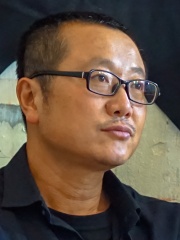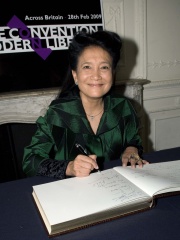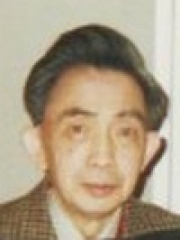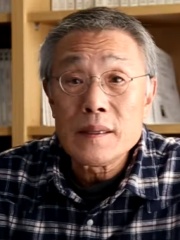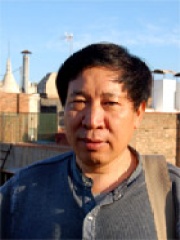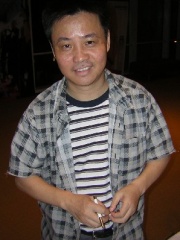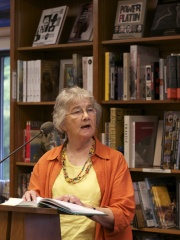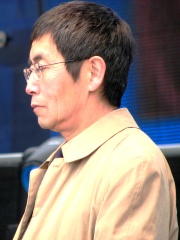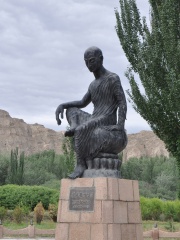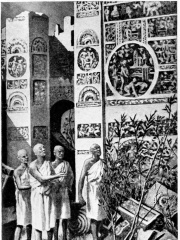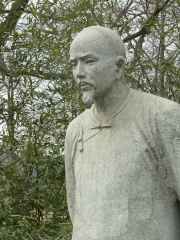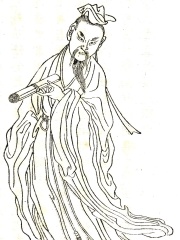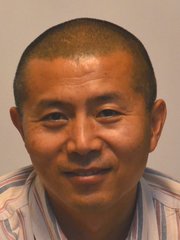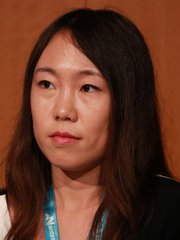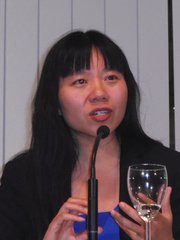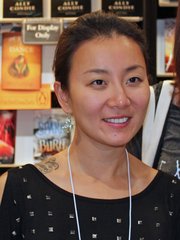
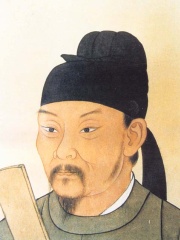
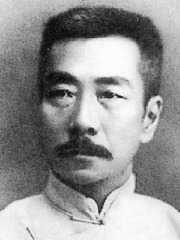
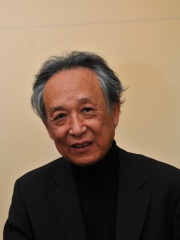
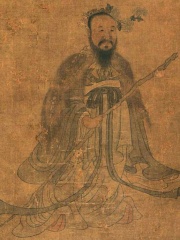
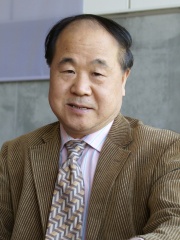

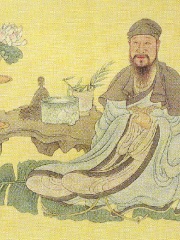
The Most Famous
WRITERS from China
Top 10
The following people are considered by Pantheon to be the top 10 most legendary Chinese Writers of all time. This list of famous Chinese Writers is sorted by HPI (Historical Popularity Index), a metric that aggregates information on a biography's online popularity. Visit the rankings page to view the entire list of Chinese Writers.

1. Li Bai (701 - 762)
With an HPI of 84.11, Li Bai is the most famous Chinese Writer. His biography has been translated into 151 different languages on wikipedia.
Li Bai (Chinese: 李白; pinyin: Lǐ Bái) and also called by his courtesy name of Taibai (太白) was a Chinese poet acclaimed as one of the best and most important poets of the Tang dynasty, and even in the whole of Chinese poetry. He and his friends such as Du Fu (712–770) were among the prominent figures in the flourishing of Chinese poetry of the Tang dynasty, often called the "Golden Age of Chinese Poetry". The expression "Three Wonders" denotes Li Bai's poetry, Pei Min's swordplay, and Zhang Xu's calligraphy. Around 1,000 poems attributed to Li are extant. His poems have been collected into the most important Tang dynasty collection, Heyue yingling ji, compiled in 753 by Yin Fan. Thirty-four of Li Bai's poems are included in the anthology Three Hundred Tang Poems, which was first published in the 18th century. Around the same time, translations of his poems began to appear in Europe. In Ezra Pound's famous work Cathay (1915), Li Bai's poems enjoy the lion's share (11 out of 19). Li Bai's poems became models for celebrating the pleasures of friendship, the depth of nature, solitude, and the joys of drinking. Among the most famous are "Waking from Drunkenness on a Spring Day" (Chinese: 春日醉起言志), "The Hard Road to Shu" (Chinese: 蜀道难), "Bring in the Wine" (Chinese: 将进酒), and "Quiet Night Thought" (Chinese: 静夜思), which are still taught in schools in China. In the West, multilingual translations of Li's poems continue to be made. His life has even taken on a legendary aspect, including tales of drunkenness and chivalry, and the well-known tale that Li drowned when he reached from his boat to grasp the moon's reflection in the river while he was drunk. Much of Li's life is reflected in his poems, which are about places he visited; friends whom he saw off on journeys to distant locations, perhaps never to meet again; his own dream-like imaginings, embroidered with shamanic overtones; current events of which he had news; descriptions of nature, perceived as if in a timeless moment; and more. However, of particular importance are the changes in China during his lifetime. His early poems were written in a "golden age" of internal peace and prosperity, under an emperor who actively promoted and participated in the arts. This ended with the beginning of the rebellion of general An Lushan, which eventually left most of Northern China devastated by war and famine. Li's poems during this period take on new tones and qualities. Unlike his younger friend Du Fu, Li did not live to see the end of the chaos. Li Bai is depicted in the Wu Shuang Pu (無雙譜, Table of Peerless Heroes) by Jin Guliang.

2. Du Fu (712 - 770)
With an HPI of 82.41, Du Fu is the 2nd most famous Chinese Writer. His biography has been translated into 117 different languages.
Du Fu (Chinese: 杜甫; pinyin: Dù Fǔ; Wade–Giles: Tu Fu; 712–770) was a Chinese poet and politician during the Tang dynasty. Together with his elder contemporary and friend Li Bai, Du is often considered one of the greatest Chinese poets of his time. His greatest ambition was to serve his country as a successful civil servant, but Du proved unable to make the necessary accommodations. His life, like all of China, was devastated by the An Lushan rebellion of 755, and his last 15 years were a time of almost constant unrest. Although initially he was little-known to other writers, his works came to be hugely influential in both Chinese and Japanese literary culture. Of his poetic writing, nearly fifteen hundred poems have been preserved over the ages. He has been called the "Poet-Historian" and the "Poet-Sage" by Chinese critics, while the range of his work has allowed him to be introduced to Western readers as "the Chinese Virgil, Horace, Ovid, Shakespeare, Milton, Burns, Wordsworth, Béranger, Hugo or Baudelaire".

3. Lu Xun (1881 - 1936)
With an HPI of 77.56, Lu Xun is the 3rd most famous Chinese Writer. His biography has been translated into 106 different languages.
Lu Xun (Chinese: 魯迅; pinyin: Lǔ Xùn, [lù ɕŷn]; 25 September 1881 – 19 October 1936), pen name of Zhou Shuren, born Zhou Zhangshou, was a Chinese writer. A leading figure of modern Chinese literature, he wrote in both vernacular and literary Chinese as a novelist, literary critic, essayist, poet, translator and political commentator, known for his satirical, acerbic tone and critical reflections on Chinese history and culture. Lu was born into a declining family of landlords and scholar-officials in Shaoxing, Zhejiang. Although he initially aspired to take the imperial examinations, his family’s limited financial means compelled him to attend government-funded schools that offered a "Western-style education." After graduation, Lu pursued medical studies at Tohoku University in Japan but eventually dropped out, turning his attention to literature. Financial difficulties forced his return to China, where he taught at various secondary schools and colleges before taking a position at the Ministry of Education of the Republic of China. Lu pioneered the New Culture Movement by publishing the first novel in vernacular Chinese, Diary of a Madman, in 1918. He gained prominence through his political writings in La Jeunesse following the May Fourth Movement in 1919. From the late 1920s onward, Lu became increasingly engaged with Marxist thought and leftist politics. In the 1930s, he served as the nominal leader of the League of Left-Wing Writers in Shanghai. After 1949, he was canonized by the People’s Republic of China.

4. Gao Xingjian (b. 1940)
With an HPI of 76.23, Gao Xingjian is the 4th most famous Chinese Writer. His biography has been translated into 92 different languages.
Gao Xingjian (Chinese: 高行健; born January 4, 1940) is a Chinese émigré and later French naturalized novelist, playwright, critic, painter, photographer, film director, and translator who in 2000 was awarded the Nobel Prize in Literature "for an oeuvre of universal validity, bitter insights and linguistic ingenuity." He is also a noted translator (particularly of Samuel Beckett and Eugène Ionesco), screenwriter, stage director, and a celebrated painter. Gao's drama is considered to be fundamentally absurdist in nature and avant-garde in his native China. Absolute Signal (1982) was a breakthrough in Chinese experimental theatre. The Bus Stop (1983) and The Other Shore (1986) had their productions halted by the Chinese government, with the acclaimed Wild Man (1985) the last work of his to be publicly performed in China. He left the country in 1987 and his plays from The Other Shore onward increasingly centered on universal (rather than Chinese) concerns, but his 1989 play Exile angered both the government for its depiction of China and the overseas democracy movement for its depiction of intellectuals. In 1997, he was granted French citizenship. Gao's influences include classical Chinese opera, folk culture, and 20th century European drama such as Antonin Artaud, and he said in 1987 that as a writer he could be placed at the meeting point between Western and Eastern cultures. He is a very private person, however, and later claimed, "No matter whether it is in politics or literature, I do not believe in or belong to any party or school, and this includes nationalism and patriotism." His prose works tend to be less celebrated in China but are highly regarded elsewhere in Europe and the West, with Soul Mountain singled out in the Nobel Prize announcement.

5. Wu Cheng'en (1500 - 1582)
With an HPI of 73.86, Wu Cheng'en is the 5th most famous Chinese Writer. His biography has been translated into 49 different languages.
Wu Cheng'en (traditional Chinese: 吳承恩; simplified Chinese: 吴承恩; pinyin: Wú Chéng'ēn; Wade–Giles: Wu2 Ch‘êng2-ên1; Jyutping: Ng4 Sing4 Jan1, c. 1500–1582 or 1505–1580), courtesy name Ruzhong (汝忠), was a Chinese novelist, poet, and politician during the Ming dynasty. He is considered by many to be the author of Journey to the West, one of the Classic Chinese Novels.

6. Qu Yuan (343 BC - 278 BC)
With an HPI of 73.42, Qu Yuan is the 6th most famous Chinese Writer. His biography has been translated into 56 different languages.
Qu Yuan (c. 340 BC – 278 BC) was a Chinese poet and aristocrat in the State of Chu during the Warring States period. He is known for his patriotism and contributions to classical poetry and verses, especially through the poems of the Chu Ci anthology (also known as The Songs of the South or Songs of Chu), a volume of poems attributed to or considered to be inspired by his verse writing. Together with the Shi Jing, the Chu Ci is one of the two greatest collections of ancient Chinese verse. He is also remembered in connection to the supposed origin of the Dragon Boat Festival. Historical details about Qu Yuan's life are few, and his authorship of many Chu Ci poems has been questioned at length. However, he is widely accepted to have written "The Lament," a Chu Ci poem. The first known reference to Qu Yuan appears in a poem written in 174 BC by Jia Yi, an official from Luoyang who was slandered by jealous officials and banished to Changsha by Emperor Wen of Han. While traveling, he wrote a poem describing the similar fate of a previous "Qu Yuan." Eighty years later, the first known biography of Qu Yuan's life appeared in Han dynasty historian Sima Qian's Records of the Grand Historian, though it contains a number of contradictory details.

7. Mo Yan (b. 1955)
With an HPI of 73.16, Mo Yan is the 7th most famous Chinese Writer. His biography has been translated into 95 different languages.
Guan Moye (simplified Chinese: 管谟业; traditional Chinese: 管謨業; pinyin: Guǎn Móyè; born 5 March 1955), better known by the pen name Mo Yan (, Chinese: 莫言; pinyin: Mò Yán), is a Chinese novelist and short story writer. In 2012, Mo was awarded the Nobel Prize in Literature for his work as a writer "who with hallucinatory realism merges folk tales, history and the contemporary". Donald Morrison of TIME referred to him as "one of the most famous, oft-banned and widely pirated of all Chinese writers", and Jim Leach called him the Chinese answer to Franz Kafka or Joseph Heller. He is best known to Western readers for his 1986 novel Red Sorghum, the first two parts of which were adapted into the Golden Bear-winning film Red Sorghum (1988). Mo won the 2005 International Nonino Prize in Italy. In 2009, he was the first recipient of the University of Oklahoma's Newman Prize for Chinese Literature.

8. Luo Guanzhong (1330 - 1400)
With an HPI of 72.31, Luo Guanzhong is the 8th most famous Chinese Writer. His biography has been translated into 35 different languages.
Luo Ben (c. 1330–1400, or c.1280–1360), better known by his courtesy name Guanzhong (Mandarin pronunciation: [lwo kwanʈʂʊŋ]), was a Chinese novelist who lived during the Ming dynasty. He is also known by his pseudonym Huhai Sanren (Chinese: 湖海散人; pinyin: Húhǎi Sǎnrén; lit. 'Leisure Man of Lakes and Seas'). Luo Guanzhong is credited with writing Romance of the Three Kingdoms, one of the Four Great Classical Novels of Chinese literature.

9. Bai Juyi (772 - 846)
With an HPI of 71.81, Bai Juyi is the 9th most famous Chinese Writer. His biography has been translated into 45 different languages.
Bai Juyi (also Bo Juyi or Po Chü-i; Chinese: 白居易, Mandarin pinyin Bǎi Jūyì; 772–846), courtesy name Letian (樂天), was a Chinese musician, poet, and politician during the Tang dynasty. Many of his poems concern his career or observations made about everyday life, including as governor of three different provinces. He achieved fame as a writer of verse in a low-key, near vernacular style that was popular throughout medieval East Asia. Bai was also influential in the historical development of Japanese literature, where he is better known by the on'yomi reading of his courtesy name, Haku Rakuten (shinjitai: 白楽天). His younger brother Bai Xingjian was a short story writer. Among his most famous works are the long narrative poems "Chang Hen Ge" ("Song of Everlasting Sorrow"), which tells the story of Yang Guifei, and "Pipa xing" ("Song of the Pipa").
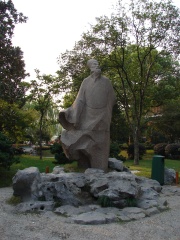
10. Su Shi (1037 - 1101)
With an HPI of 71.71, Su Shi is the 10th most famous Chinese Writer. His biography has been translated into 42 different languages.
Su Shi (simplified Chinese: 苏轼; traditional Chinese: 蘇軾; pinyin: Sū Shì; 8 January 1037 – 24 August 1101), courtesy name Zizhan (子瞻), art name Dongpo (東坡), was a Chinese poet, essayist, calligrapher, painter, scholar-official, literatus, artist, pharmacologist, and gastronome who lived during the Song dynasty. A major personality of the Song era, Su was an important figure in Song Dynasty politics, he had a lengthy career in bureaucracy, taking various provincial posts and briefly serving as a senior official at the imperial court. Despite his high hopes to serve the country, Su's political career was filled with frustrations due to his out-spoken criticism, and he often fell victim to political rivalries between the radical and the conservative forces. He endured a series of political exiles during which his creative career flourished. Su is widely regarded as one of the most accomplished figures in classical Chinese literature, leaving behind him a prolific collection of poems, lyrics, prose, and essays. His poetry had enduring popularity and influence in China and other areas in the near vicinity such as Japan, and is well known in some English-speaking countries through translations by Stephen Owen, Burton Watson, and Arthur Waley, among others. In arts, Su was described by Murck as "the preeminent personality of the eleventh century." His prose writings contributed to the understanding of topics including 11th-century China's travel literature and iron industry. His writing frequently touched upon the topic of cuisine, where he is considered to have had a profound influence. Dongpo pork, a prominent dish in Hangzhou cuisine, is named in his honor. Su remains a revered and beloved figure among both intellectuals and the general populace, transcending the boundaries of his era. Contemporary Chinese scholars Zhu Gang and Wang Shuizhao observed that Su's impact on Chinese people's values and beliefs is profound, stating that his cultural and philosophical influence rivals that of notable philosophers like Mencius and Zhuangzi.
People
Pantheon has 136 people classified as Chinese writers born between 343 BC and 1996. Of these 136, 39 (28.68%) of them are still alive today. The most famous living Chinese writers include Gao Xingjian, Mo Yan, and Liu Cixin. The most famous deceased Chinese writers include Li Bai, Du Fu, and Lu Xun. As of April 2024, 8 new Chinese writers have been added to Pantheon including Bi Feiyu, Chen Ran, and Shi Tao.
Living Chinese Writers
Go to all RankingsGao Xingjian
1940 - Present
HPI: 76.23
Mo Yan
1955 - Present
HPI: 73.16
Liu Cixin
1963 - Present
HPI: 65.66
Erin Hunter
HPI: 62.42
Jung Chang
1952 - Present
HPI: 61.47
François Cheng
1929 - Present
HPI: 60.71
Can Xue
1953 - Present
HPI: 60.12
Hwang Sok-yong
1943 - Present
HPI: 58.90
Yan Lianke
1958 - Present
HPI: 58.80
Yu Hua
1960 - Present
HPI: 58.76
Katherine Paterson
1932 - Present
HPI: 58.42
Bei Dao
1949 - Present
HPI: 57.98
Deceased Chinese Writers
Go to all RankingsLi Bai
701 - 762
HPI: 84.11
Du Fu
712 - 770
HPI: 82.41
Lu Xun
1881 - 1936
HPI: 77.56
Wu Cheng'en
1500 - 1582
HPI: 73.86
Qu Yuan
343 BC - 278 BC
HPI: 73.42
Luo Guanzhong
1330 - 1400
HPI: 72.31
Bai Juyi
772 - 846
HPI: 71.81
Su Shi
1037 - 1101
HPI: 71.71
Kumārajīva
343 - 413
HPI: 71.30
Faxian
340 - 418
HPI: 70.81
Cao Xueqin
1724 - 1763
HPI: 70.07
Ban Gu
32 - 92
HPI: 69.92
Newly Added Chinese Writers (2025)
Go to all RankingsBi Feiyu
HPI: 45.23
Chen Ran
1962 - Present
HPI: 43.72
Shi Tao
1968 - Present
HPI: 40.83
Hao Jingfang
1984 - Present
HPI: 38.77
Xia Jia
1984 - Present
HPI: 38.73
R. F. Kuang
1996 - Present
HPI: 38.44
Xiaolu Guo
1973 - Present
HPI: 38.05
Marie Lu
1984 - Present
HPI: 32.47
Overlapping Lives
Which Writers were alive at the same time? This visualization shows the lifespans of the 25 most globally memorable Writers since 1700.

